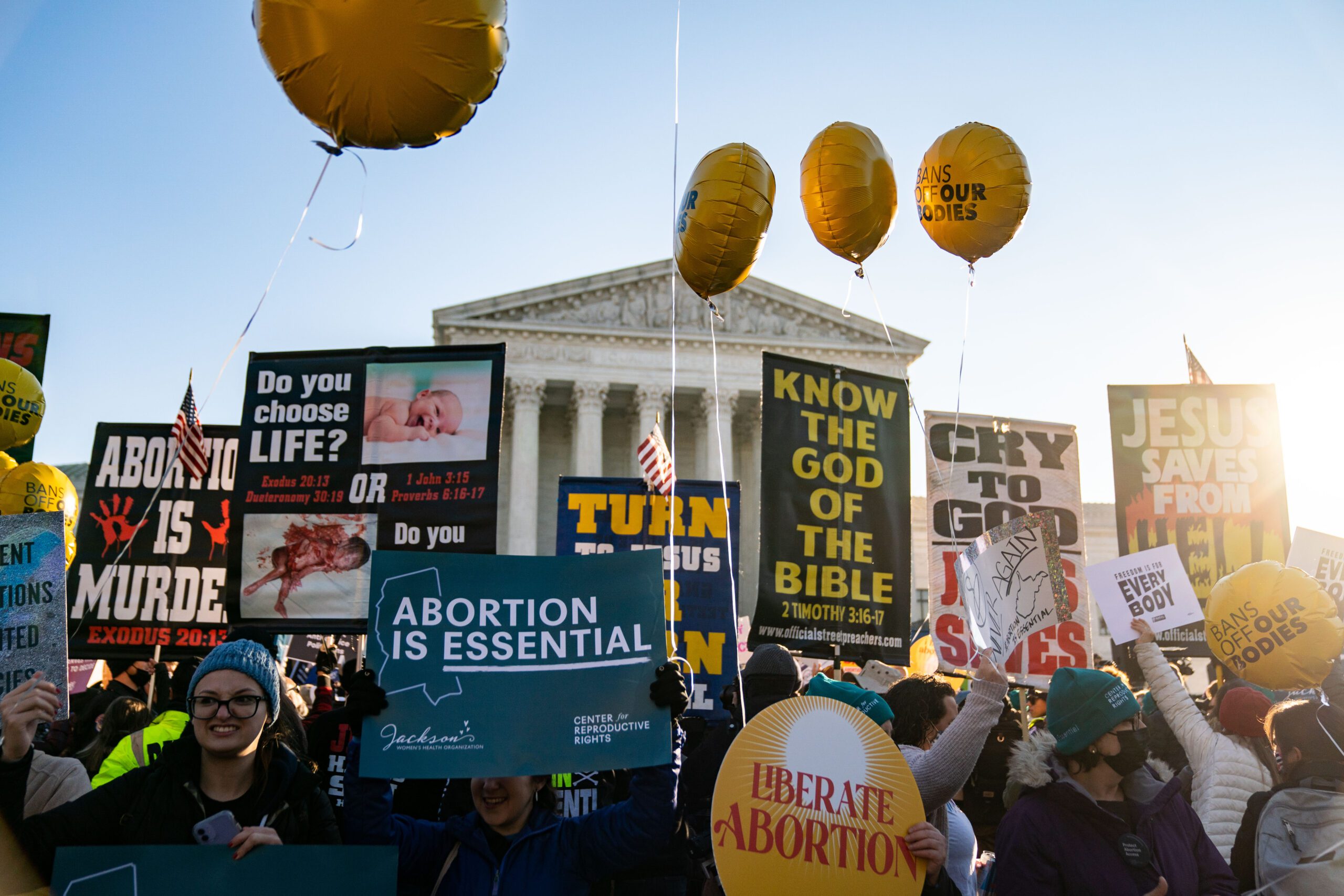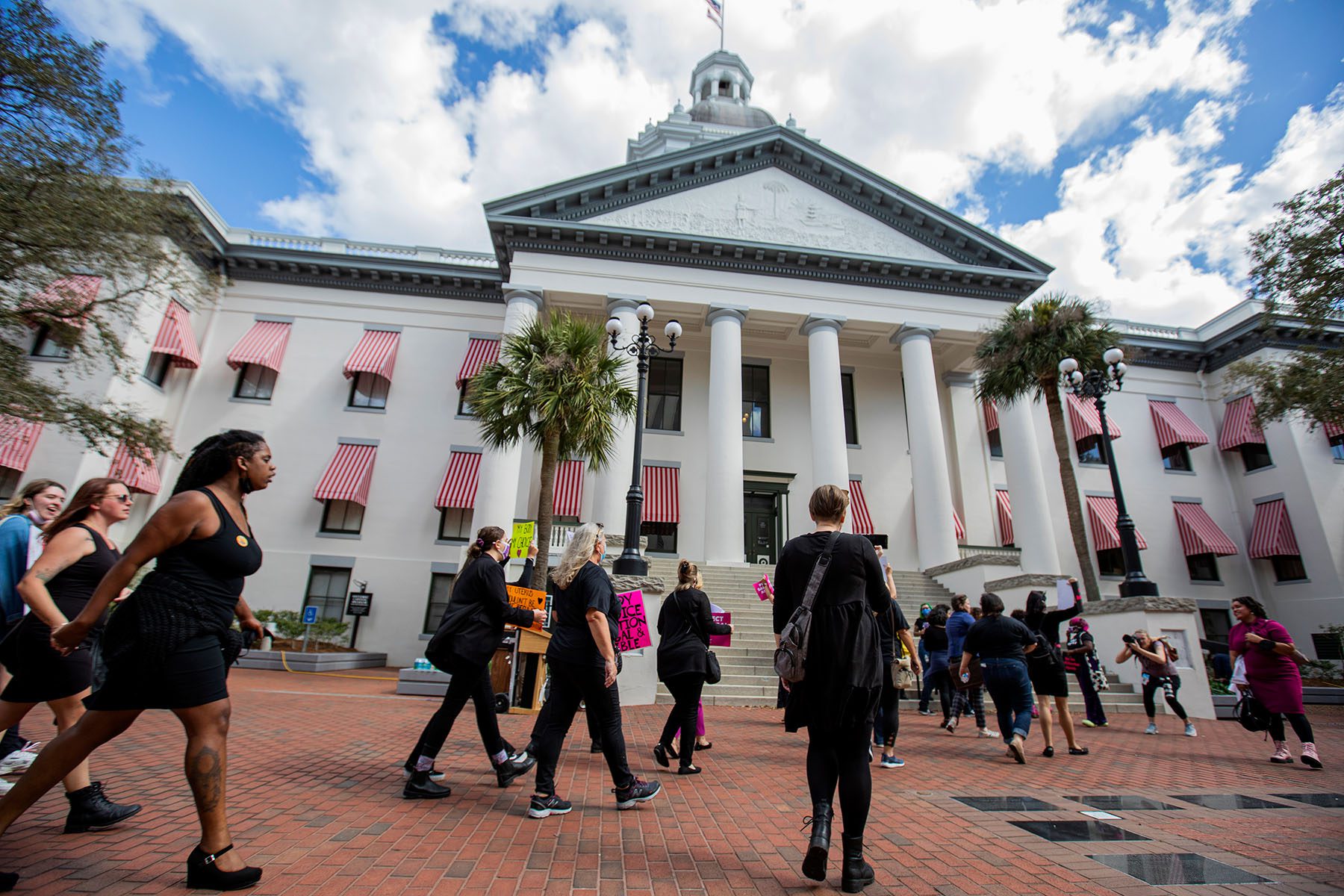Three states are poised to pass laws banning abortions after 15 weeks of pregnancy — a limit not currently allowed under Roe v. Wade but one that could soon become legal if the landmark Supreme Court case is weakened or overturned, which is likely to happen this summer.
Florida’s legislature passed a bill Thursday night that would ban abortion at 15 weeks of pregnancy. Gov. Ron DeSantis is expected to sign the legislation imminently, and it is set to take effect July 1.
Bills are also moving in West Virginia and Arizona, where at least one legislative chamber has passed a bill instituting a 15-week ban. Both states have Republican majorities in their state legislatures, as well as Republican governors who have indicated they support abortion restrictions.
None of these bans would have an immediate impact, in part because of how each state legislature works, and in part because of the likelihood that abortion rights supporters will file legal challenges, citing the bills’ violations of Roe v. Wade’s protections. But the bills indicate a path for states to curb abortion access while not altogether stopping it. Some people believe the Supreme Court is more likely to allow a 15-week abortion ban than a six-week ban, or a total prohibition of the procedure.
“From where we are today, where abortion is legal up until viability, 15 weeks is obviously dramatic in terms of the shortened amount of time,” said Laurie Sobel, associate director of women’s health policy at the nonpartisan Kaiser Family Foundation. “But because of the dialogue around Texas it suddenly seems, among people who don’t follow it closely, like, oh well, 15 weeks, that seems like a good compromise.’”
Will these laws take effect? What impact would they have? What do they say about the future of abortion access? The 19th explores the implications of these 15-week bans.
Do these laws violate Roe v. Wade? Does that matter?
Currently, 15-week bans are considered unconstitutional because of the abortion rights guarantee established in Roe v. Wade. Per the 1973 ruling, which was reaffirmed in 1993, the Supreme Court held that the Constitution preserves the right to an abortion up until a fetus can live independently outside the womb, typically around 23 to 25 weeks.
But the Supreme Court is currently revisiting that decision in a case argued this past December. The case, Dobbs v. Jackson Women’s Health Organization, concerns a Mississippi law that would ban abortions after 15 weeks, well before the threshold established by Roe v. Wade.
Mississippi’s law has not taken effect. But in its arguments before the court, Mississippi’s attorney general argued not only that the 15-week ban should stand but that justices should use this opportunity to reverse Roe v. Wade. That would allow states to ban abortion entirely.
At the December oral arguments, a majority of the court’s justices indicated openness to weakening or eliminating the Roe protection. Legal observers expect the court to either effectively undo Roe v. Wade entirely or allow states to ban abortion from 15 weeks onward.
No lawmaker or expert has put forth medical reasoning to explain the 15-week threshold.
A decision in the case is expected in June or July.
When would these new 15-week bans take effect?
In West Virginia, laws typically take effect 90 days after they have been signed — putting that state’s bill on track for enforcement by the end of May or early June depending on when exactly it’s passed and signed. Florida’s bill says its law would take effect July 1. And in Arizona, new laws generally take effect 90 days after the legislature adjourns, which means it would probably have a start date around August.
But all that depends on when and how the Supreme Court has ruled on the Dobbs case. If the court has not yet opened the door to 15-week bans, these new state laws could be temporarily blocked or delayed.
Both West Virginia and Arizona also have total abortion bans, passed before 1973, could take effect if Roe is completely overturned. (West Virginia’s dates back to 1848.) If those laws do in fact take effect, they could supersede these newer 15-week bans.

What kind of impact would these 15-week bans have?
Republican supporters have sought to frame the 15-week ban as a moderate compromise compared with total abortion bans or laws like one in Texas, which prohibits the procedure after six weeks of pregnancy and deputizes private citizens to enforce it via civil lawsuits. Nationally, almost 93 percent of abortions occur before 13 weeks of pregnancy, per federal data collected in 2019.
But abortions performed later than 15 weeks usually involve extenuating circumstances: serious health concerns that developed later in pregnancy, or cases in which a patient wasn’t able to collect the money and other support — time off from work or child care, for instance — to come any sooner. Minors who are unable to tell their parents, or who became pregnant as a result of rape or incest, are also more likely to face delays that could put them past the 15-week mark.
“If you’ve never had a period before, or you’re not familiar with your period or you don’t understand the consequences or what can happen to your body from rape, intercourse or you don’t understand what those things are — you could be pregnant well past 15 weeks before being aware,” said Amber Gavin, vice president of advocacy and operations for A Woman’s Choice, an abortion clinic network that operates in Jacksonville, Florida. The clinic provides abortions just past 20 weeks.
Are there exceptions to the bans?
None of the bans being discussed have exceptions for people who became pregnant as a result of rape or incest.
The Florida bill says it would allow for abortions after 15 weeks only if two separate doctors could detect a “fatal fetal abnormality.” Arizona’s would allow an exception only if doctors believe giving birth would put the pregnant person at “serious risk of substantial and irreversible impairment of a major bodily function.” West Virginia says its ban does not apply if there is a “medical emergency or in the case of a severe fetal abnormality.”
In practice, though, it’s unclear if those exceptions would have much of an impact, Sobel said. Patients have to know those exceptions exist, and doctors run the risk of criminal penalty if someone second-guesses their definition of an emergency.
“If you’re facing a year in prison and losing your medical license based upon providing an abortion after 15 weeks because of a medical emergency?” Sobel said. “The chilling effect on providers could be real, especially if they start enforcing this and you see doctors facing criminal charges.”
How will these laws affect people who live in neighboring states?
Florida, which currently allows abortion up to 24 weeks, has long been considered a potential refuge if Roe is overturned: Nearby states like Mississippi, Alabama, Georgia and Louisiana all have laws on the books that would ban most or all abortions if Roe is overturned, though none are currently enforced.
“We’re already seeing patents from Georgia and different parts of the country coming from places where abortion is already restricted,” said Gavin in Jacksonville. “Folks in the southeast area are going to have to travel to North Carolina.”
West Virginia’s law has a similar potential for regional impact, said Katie Quinonez, executive director of the Women’s Health Center of West Virginia, the state’s sole abortion clinic, which currently provides abortions up until 17 weeks and 6 days. She worries about the loss of even three weeks in which people can get abortions.
In 2019, about 14 percent of abortions performed in West Virginia were for people who had traveled from out of state, according to data collected by the Centers for Disease Control and Prevention. Many of those patients come from Ohio and Kentucky, Quinonez said — states where legislators are now weighing their own new abortion restrictions, including a six-week ban in Ohio modeled after the one currently active in Texas.
That could create a cascading effect, making it harder for people across the region to access care, Sobel said.
“It’s going to be very challenging for a lot of people,” she said. “I don’t want to say it’s a picnic right now. It’s not like people have been able to access abortion freely in those states right now. But it’s going to become more challenging.”








